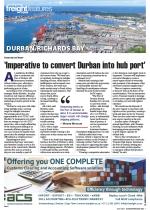Travel bans imposed by foreign countries on South Africa due to the ongoing global pandemic have significantly impacted cargo volumes at the Dube Cargo Terminal at the King Shaka International Airport. According to Hamish Erskine, CEO Dube Trade Port Special Economic Zone, the bans have seen several airlines suspending f lights to Durban, reducing the connectivity of the airport and cargo capacity, given that the majority of airfreight through the terminal is f lown in the bellies of passenger aircraft. “To date, around 76% of the domestic route network to King Shaka International Airport has been restored. On the international front, only Qatar Airways is servicing the Durban route, impacting our freight forwarding community,” he said. “Additionally, the implementation of some of the bulk infrastructure projects like the bulk earthworks in Dube AgriZone 2 and bulk infrastructure in Dube Trade Zone 2, were also delayed as lockdown forced a downtime on these projects. This is being addressed now, with a revision of deadlines where necessary and accelerated delivery schedules where possible.” Erskine said what would have a longer-term impact on the progress of the project overall was the appetite for investment. “Here we will need the economy to strengthen, for investors to be in a position to access capital to invest.” He said investor retention had been the key priority at the cargo terminal amidst the Covid-19 pandemic.“ Especially on the industrial and commercial property side of our business, we have been working to alleviate some of the impact of the pandemic on our tenants and investors.” Through the implementation of an investor retention strategy, the trade port has given support through rental deferments and rental concessions, as well as marketing support – and intra-governmental facilitation where necessary. “Through these interventions, we have managed to retain more than 90% of our tenants and 100% of our investors, despite adverse economic conditions,” said Erskine. He said they had also created integrated teams with professionals from several disciplines to deal with pressing challenges that arose on an ad-hoc basis. “The impact of the pandemic on business is dynamic; these teams are there to anticipate any changes and help the organisation formulate adaptive measures, as we work to support businesses through this period. Covid-19 has exposed the vulnerabilities of long supply chains,” said Erskine. “This has spurred more interest in localisation in several industries, which presents a huge opportunity for local manufacturing and the establishment of local supply chains in the medical and pharmaceutical, electronics and automotive industries. We are already positioned to accommodate these within our precinct, with Dube TradeZone 2 and the mini-factories that are now available in Dube TradeZone 1.”An investor retention strategy has given support through rental deferments and rental concessions.– Hamish Erskine

